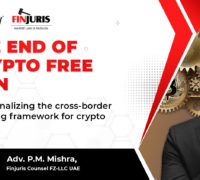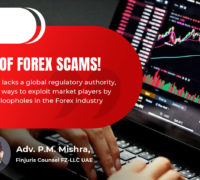The advent of cryptocurrency welcomed chaos in the world of finance. Thanks to the lack of regulations and decentralized nature of cryptocurrencies, the industry was filled with ambiguity which resulted in various financial crimes across the globe. However, the free rein of cryptocurrency is now coming to an end. The credit goes to Organisation for … Read More →
As the industry lacks a global regulatory authority, scammers find ways to exploit marketplayers by looking out for loopholes in the Forex industry” – Adv. P.M. Mishra, Finjuris Counsel FZ-LLC UAE Regrettably, fraud exists in all commercial spheres, including the Forex market. Even in 2022, unscrupulous Forex brokers continue to defraud unwary traders. Brokers that … Read More →


